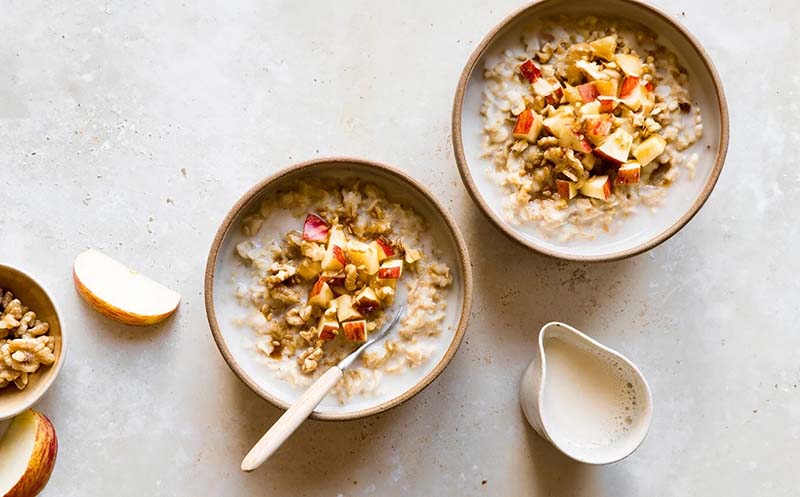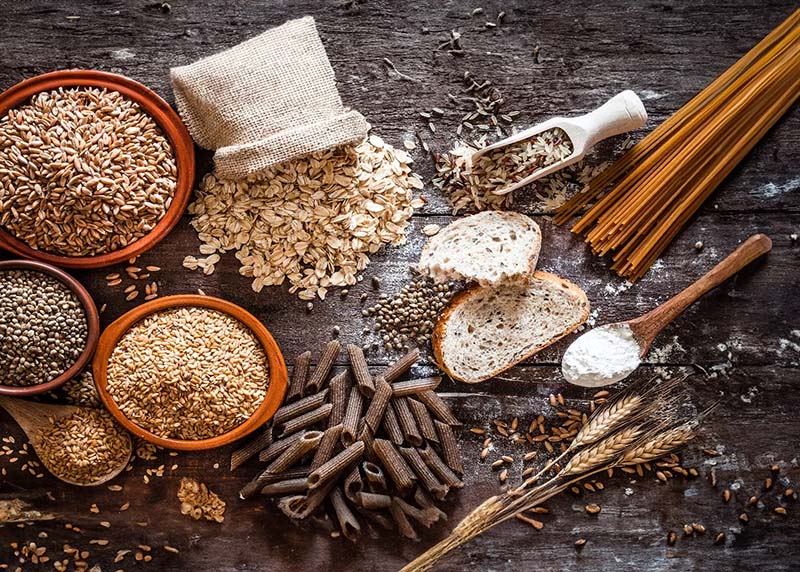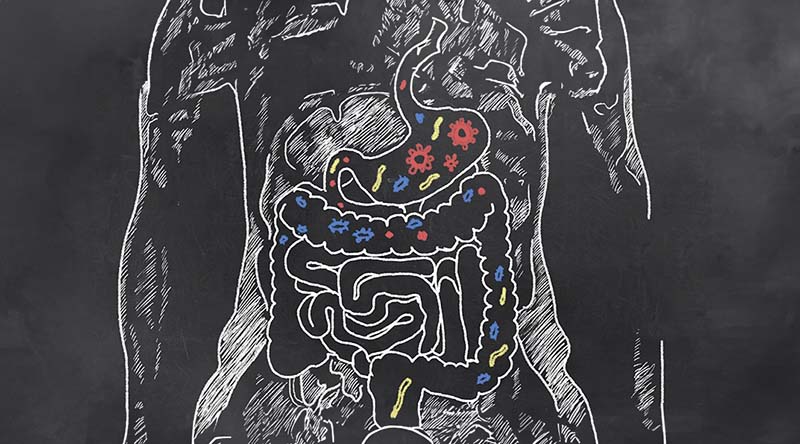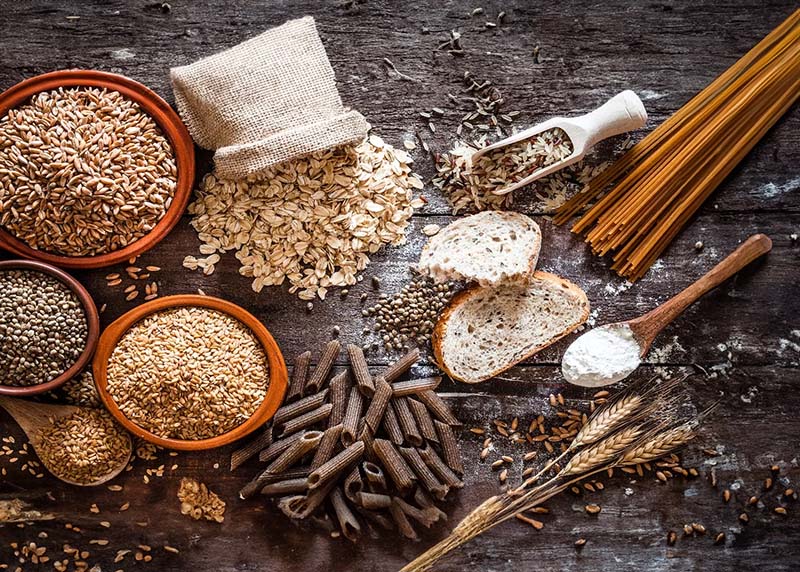Every day, we face the challenge of choosing the perfect breakfast that not only satisfies our hunger but also provides the essential energy and nutrients needed to kickstart our day. Whether you’re in a rush and need a quick on-the-go option or craving a hearty spread, your breakfast should meet certain criteria to keep you nourished and energized. One versatile and wholesome breakfast choice that checks all these boxes is oatmeal. It’s a simple yet incredibly versatile option that is not only easy and quick to prepare but also offers a multitude of health benefits.
But a question that often arises is, “Does Oatmeal Help with Weight Loss?” This is particularly important for those looking to manage their weight effectively. In this article, we will explore the goodness of oatmeal and why it should be a staple in your breakfast routine, especially when considering its impact on weight loss.
Related articles
- Are Oysters Good for Weight Loss? Discover Key Benefits.
- Does Spinach Help You Lose Weight? Surprising Insights.
- Is Pumpkin Good for Weight Loss? Exploring Nutritional Facts!.
Does Oatmeal Help with Weight Loss?
Oatmeal has long been recognized as a beneficial food in weight loss journeys. Extensive research, including a study from the Journal of the American College of Nutrition, highlights oatmeal’s effectiveness in prolonging satiety compared to traditional breakfast cereals. This longer feeling of fullness can lead to reduced calorie intake throughout the day.
Furthermore, a 2016 study in the Journal of Nutrition underscores the role of beta-glucan, a fiber in oatmeal, in enhancing satiety. This can be instrumental in weight management. The implication here is clear: integrating oatmeal into your daily breakfast routine could be a strategic move for those aiming to lose weight.

However, it’s important to remember that no single food can be a panacea for weight loss. Incorporating oatmeal into your diet can be a smart strategy, thanks to its fiber content that helps you feel fuller, potentially leading to lower overall calorie consumption. But remember, the fundamental principle of weight loss remains: you need to burn more calories than you consume. Without creating a calorie deficit, you won’t see changes in your weight.
Tips: For an extra boost, consider pairing your oatmeal with protein-rich toppings like nuts or yogurt. This combination can further enhance the feeling of fullness and provide additional nutritional benefits. Remember, though, to keep an eye on portion sizes to maintain the calorie balance.
Oatmeal Nutritional Information
Oats are a nutritional powerhouse, offering a well-rounded profile of essential nutrients. They’re an excellent source of carbohydrates and fiber, particularly beta-glucan, a type of fiber known for its health benefits.
Protein is another key component of oats, providing a well-balanced array of essential amino acids, which are the building blocks of proteins in our body.
Oats are also rich in vital vitamins, minerals, and antioxidant compounds that play a crucial role in overall health. A half-cup serving (about 40.5 grams) of dry oats delivers a substantial portion of the daily value (DV) of several nutrients:
- Manganese: 63.91%
- Phosphorus: 13.3%
- Magnesium: 13.3%
- Copper: 17.6%
- Iron: 9.4%
- Zinc: 13.4%
- Folate: 3.24%
- Vitamin B1 (Thiamin): 15.5%
- Vitamin B5 (Pantothenic Acid): 9.07%
Additionally, oats contain smaller amounts of calcium, potassium, vitamin B6 (Pyridoxine), and vitamin B3 (Niacin).
When it comes to prepared oatmeal (one cup, made from a half cup of dry oats with water), the nutritional content includes:
- Carbohydrates: 27.4 grams
- Protein: 5.3 grams
- Fat: 2.6 grams
- Fiber: 4 grams
- Total Calories: 153.5
Weight Loss Benefits of Oatmeal
Oatmeal is a nutritional powerhouse that can be a key player in weight loss for several reasons. Here’s why incorporating oatmeal into your diet could be beneficial for shedding those extra pounds:
Keep feeling full for a long time
Oatmeal is a remarkable food that offers several health benefits, key among them being its ability to help you feel full for a longer period. This is due to its rich content of complex carbohydrates and a type of soluble fiber known as beta-glucan.
This fiber forms a gel-like substance in the digestive tract, slowing down stomach emptying and glucose absorption. This action helps regulate appetite and prolongs satiety, potentially leading to reduced calorie intake, which is beneficial for both weight management and overall health.

Reduce the risk of heart disease
In terms of heart health, oatmeal is a powerful ally. The beta-glucan fiber in oatmeal has been shown to effectively reduce total and LDL (bad) cholesterol levels, both of which are risk factors for heart disease. It works by binding to cholesterol in the intestines and preventing its absorption into the bloodstream. Additionally, oats contain antioxidants like avenanthramides, which reduce inflammation and improve blood vessel function, further contributing to cardiovascular health.

Available and healthy
Oatmeal is also an accessible and healthy food option. It is a whole grain that is easy to incorporate into various diets and is packed with essential nutrients like manganese, phosphorus, magnesium, and iron. The antioxidants in oats, especially avenanthramides, have anti-inflammatory and anti-itching properties, making oatmeal a wholesome choice for overall well-being.

Enhances skin health and enhances immunity
Regarding skin health and immunity, colloidal oatmeal (finely ground oats) is recognized by the FDA as a skin protectant. Oats contain bioactive compounds like avenanthramides, which have anti-inflammatory and antioxidant properties beneficial for skin health. Additionally, the beta-glucan in oats is known to enhance immune responses, potentially boosting immunity and overall health.
Balance your gut microbiome
Finally, oatmeal can play a role in balancing the gut microbiome. Its high fiber content is beneficial for gut health, fostering a balanced and healthy intestinal environment.

Are There Any Side Effects of Eating Oatmeal?
While oatmeal is generally considered a healthy and beneficial food, there are a few potential side effects to be aware of:
Antinutrient property
Despite its nutritious profile, oatmeal, like many grains, contains phytic acid, an antinutrient. Phytic acid can hinder the absorption of vitamins and minerals from oats into the body. To counterbalance this potential nutritional loss, it’s recommended to include a diverse range of fruits and vegetables in your diet. These additional foods can help ensure you’re getting a full spectrum of nutrients.
A high savory snack can make you consume more
Oatmeal is a significant source of carbohydrates, and its enjoyable taste might lead to overconsumption. Eating too much oatmeal, especially without proper portion control, can contribute to weight gain, negating its potential benefits for weight management or loss.
How Much Oatmeal Per Day to Lose Weight?
For weight loss, the appropriate amount of oatmeal to consume daily is crucial. Oats are high in dietary fiber, which aids in promoting a feeling of fullness, reducing the absorption of fats and carbohydrates, and stabilizing blood sugar levels. These properties make oats an excellent choice for those looking to manage their weight.
The daily recommended serving size of oats for those aiming to lose weight is typically around half a cup or 50 grams. This portion size is sufficient to provide the benefits of fiber and nutrients while keeping calorie intake in check.

As for the best time to eat oats for weight loss, incorporating them into your breakfast or dinner is ideal. Eating oatmeal for breakfast can help kickstart your metabolism and keep you feeling full throughout the morning, reducing the likelihood of snacking on high-calorie foods. Having oats for dinner can be equally beneficial, as their high fiber content can prevent late-night cravings and overeating.
It’s also important to be mindful of what you add to your oatmeal. Opt for healthy toppings like fruits, nuts, and seeds, and avoid high-calorie sweeteners or excessive amounts of added sugars. This will help ensure that your oatmeal remains a healthy, weight-loss-friendly meal option.
Conclusion
In conclusion, oatmeal is undoubtedly your go-to breakfast for a quick, healthy, and delicious start to your day. Its numerous benefits, including answering the common query “Is oatmeal good for weight loss?”, make it a smart choice for everyone. We’d love to hear your oatmeal success stories! And don’t forget to explore more of Blonde Beauty‘s insightful blogs on health and nutrition. Oats – your path to a better breakfast and a healthier you!

Laureate Professor Clare Collins
Professor Clare Collins is a leading expert in nutrition and dietetics at the School of Health Sciences, part of the College of Health, Medicine and Wellbeing. Her work is changing the way we think about food and health. She grew up as one of nine children and was the first in her family to finish high school and go to college. This background gave her a strong work ethic and a deep appreciation for seizing opportunities.
As the Director of the Hunter Medical Research Institute’s Food and Nutrition Program and a recipient of three NHMRC Research Fellowships, Professor Collins is making a big difference in public health. She focuses on helping people who are often overlooked, using new technologies like apps and online programs to improve their nutrition and reduce the risk of chronic diseases.
Professor Collins is well-respected and has been recognized as a Fellow in four major health and science organizations. She leads a diverse team of experts, including dietitians, computer scientists, and engineers, working together on global health projects.
Her achievements are impressive. She has received over $29 million in research funding, published more than 450 papers, and helped 35 PhD and Master’s students complete their degrees. She’s also active in sharing her knowledge with the public. She has developed tools like the Australian Eating Survey and the Healthy Eating Quiz, and she often appears in the media to talk about nutrition.
PUBLISHED ARTICLES
- Collins, C. (2019). “The Effect of a Pilot Dietary Intervention on Pain Outcomes in Patients Attending a Tertiary Pain Service.”
- Collins, C. (2022). “Variation in cardiovascular disease risk factors among older adults.”
- Collins, C. (2022). “Evaluation of an online intervention for improving stroke survivors’ health-related quality of life: A randomised controlled trial.”
These articles show Professor Collins’s commitment to understanding how better nutrition can improve health. Her work is important for researchers, doctors, and anyone interested in healthy living.
